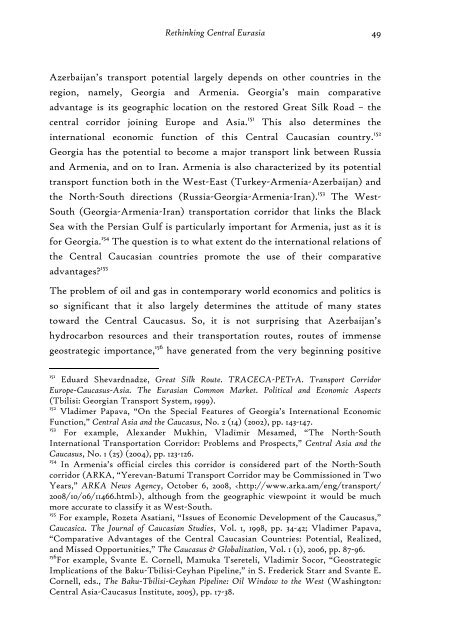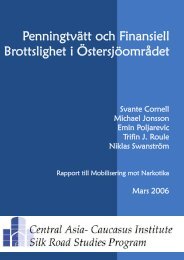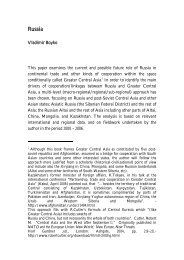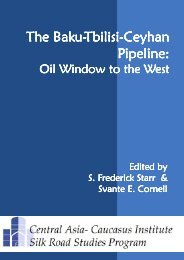Eurasianism and the Concept of Central Caucaso-Asia
Eurasianism and the Concept of Central Caucaso-Asia
Eurasianism and the Concept of Central Caucaso-Asia
You also want an ePaper? Increase the reach of your titles
YUMPU automatically turns print PDFs into web optimized ePapers that Google loves.
Rethinking <strong>Central</strong> Eurasia 49<br />
Azerbaijan’s transport potential largely depends on o<strong>the</strong>r countries in <strong>the</strong><br />
region, namely, Georgia <strong>and</strong> Armenia. Georgia’s main comparative<br />
advantage is its geographic location on <strong>the</strong> restored Great Silk Road – <strong>the</strong><br />
central corridor joining Europe <strong>and</strong> <strong>Asia</strong>. 151 This also determines <strong>the</strong><br />
international economic function <strong>of</strong> this <strong>Central</strong> Caucasian country. 152<br />
Georgia has <strong>the</strong> potential to become a major transport link between Russia<br />
<strong>and</strong> Armenia, <strong>and</strong> on to Iran. Armenia is also characterized by its potential<br />
transport function both in <strong>the</strong> West-East (Turkey-Armenia-Azerbaijan) <strong>and</strong><br />
<strong>the</strong> North-South directions (Russia-Georgia-Armenia-Iran). 153 The West-<br />
South (Georgia-Armenia-Iran) transportation corridor that links <strong>the</strong> Black<br />
Sea with <strong>the</strong> Persian Gulf is particularly important for Armenia, just as it is<br />
for Georgia. 154 The question is to what extent do <strong>the</strong> international relations <strong>of</strong><br />
<strong>the</strong> <strong>Central</strong> Caucasian countries promote <strong>the</strong> use <strong>of</strong> <strong>the</strong>ir comparative<br />
advantages? 155<br />
The problem <strong>of</strong> oil <strong>and</strong> gas in contemporary world economics <strong>and</strong> politics is<br />
so significant that it also largely determines <strong>the</strong> attitude <strong>of</strong> many states<br />
toward <strong>the</strong> <strong>Central</strong> Caucasus. So, it is not surprising that Azerbaijan’s<br />
hydrocarbon resources <strong>and</strong> <strong>the</strong>ir transportation routes, routes <strong>of</strong> immense<br />
geostrategic importance, 156 have generated from <strong>the</strong> very beginning positive<br />
151 Eduard Shevardnadze, Great Silk Route. TRACECA-PETrA. Transport Corridor<br />
Europe-Caucasus-<strong>Asia</strong>. The Eurasian Common Market. Political <strong>and</strong> Economic Aspects<br />
(Tbilisi: Georgian Transport System, 1999).<br />
152 Vladimer Papava, “On <strong>the</strong> Special Features <strong>of</strong> Georgia’s International Economic<br />
Function,” <strong>Central</strong> <strong>Asia</strong> <strong>and</strong> <strong>the</strong> Caucasus, No. 2 (14) (2002), pp. 143-147.<br />
153 For example, Alex<strong>and</strong>er Mukhin, Vladimir Mesamed, “The North-South<br />
International Transportation Corridor: Problems <strong>and</strong> Prospects,” <strong>Central</strong> <strong>Asia</strong> <strong>and</strong> <strong>the</strong><br />
Caucasus, No. 1 (25) (2004), pp. 123-126.<br />
154 In Armenia’s <strong>of</strong>ficial circles this corridor is considered part <strong>of</strong> <strong>the</strong> North-South<br />
corridor (ARKA, “Yerevan-Batumi Transport Corridor may be Commissioned in Two<br />
Years,” ARKA News Agency, October 6, 2008, ), although from <strong>the</strong> geographic viewpoint it would be much<br />
more accurate to classify it as West-South.<br />
155 For example, Rozeta Asatiani, “Issues <strong>of</strong> Economic Development <strong>of</strong> <strong>the</strong> Caucasus,”<br />
Caucasica. The Journal <strong>of</strong> Caucasian Studies, Vol. 1, 1998, pp. 34-42; Vladimer Papava,<br />
“Comparative Advantages <strong>of</strong> <strong>the</strong> <strong>Central</strong> Caucasian Countries: Potential, Realized,<br />
<strong>and</strong> Missed Opportunities,” The Caucasus & Globalization, Vol. 1 (1), 2006, pp. 87-96.<br />
156 For example, Svante E. Cornell, Mamuka Tsereteli, Vladimir Socor, “Geostrategic<br />
Implications <strong>of</strong> <strong>the</strong> Baku-Tbilisi-Ceyhan Pipeline,” in S. Frederick Starr <strong>and</strong> Svante E.<br />
Cornell, eds., The Baku-Tbilisi-Ceyhan Pipeline: Oil Window to <strong>the</strong> West (Washington:<br />
<strong>Central</strong> <strong>Asia</strong>-Caucasus Institute, 2005), pp. 17-38.






